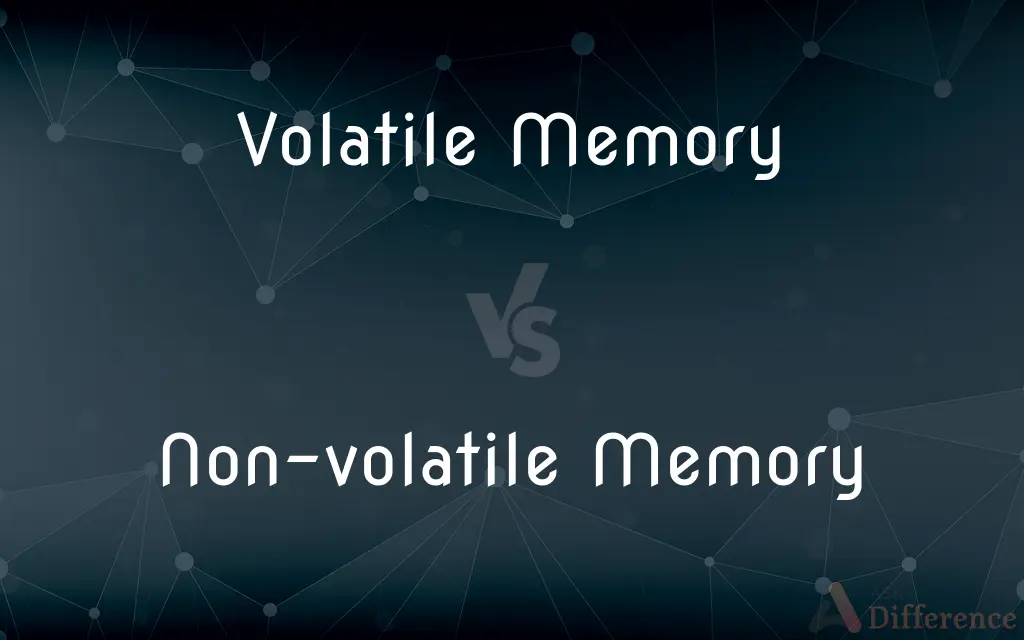Volatile Memory vs. Non-volatile Memory — What's the Difference?
Edited by Tayyaba Rehman — By Fiza Rafique — Published on November 25, 2023
Volatile Memory requires power to retain data, while Non-volatile Memory preserves data even when power is off.

Difference Between Volatile Memory and Non-volatile Memory
Table of Contents
ADVERTISEMENT
Key Differences
Volatile Memory, such as RAM, loses all stored information when the device is powered down, whereas Non-volatile Memory, like SSDs, retains data even after the device is turned off. Each serves unique roles in computer architecture, providing temporary data storage or long-term preservation, respectively.
Volatile Memory is synonymous with temporary data storage, crucial for system processes while the device is on. In contrast, Non-volatile Memory is permanent storage, responsible for keeping data secure over time, irrespective of power supply fluctuations.
Speed is a defining attribute when contrasting Volatile Memory with Non-volatile Memory. Volatile Memory typically offers faster data access, indispensable for active system tasks. However, Non-volatile Memory, while generally slower, provides essential data durability, safeguarding user information and system files.
In terms of data safety, Volatile Memory isn't relied upon for secure, long-term data storage, given its susceptibility to data loss upon power disruptions. Non-volatile Memory, however, is entrusted with the user's data security, ensuring information integrity regardless of power status.
Cost variations are notable between Volatile Memory and Non-volatile Memory. Volatile Memory is often more affordable but requires continuous power and doesn't offer long-term storage. Non-volatile Memory, conversely, is typically costlier, attributable to its enduring data preservation characteristics.
ADVERTISEMENT
Comparison Chart
Data Retention
Requires power
Retains without power
Usage Purpose
Temporary storage
Permanent storage
Access Speed
Generally faster
Slower than volatile
Data Safety
Loses data if power is off
Keeps data without power
Cost
Usually less expensive
More expensive due to permanence
Compare with Definitions
Volatile Memory
It's primarily used for temporary data storage.
The system stored the application data in its Volatile Memory.
Non-volatile Memory
Non-volatile Memory includes forms like SSDs and flash memory.
The Non-volatile Memory on this device allows for quicker boot times than traditional hard drives.
Volatile Memory
It includes types like RAM (Random Access Memory).
I need to upgrade the Volatile Memory in my gaming rig for better performance.
Non-volatile Memory
It preserves system settings, user data, and essential information.
Even if the battery dies, the settings stored in Non-volatile Memory remain intact.
Volatile Memory
Volatile Memory is integral for system tasks and active data.
Without enough Volatile Memory, multitasking on the computer becomes sluggish.
Non-volatile Memory
It's used for long-term data storage.
We store our software on Non-volatile Memory for safekeeping.
Volatile Memory
Volatile Memory is computer memory that requires power to maintain the stored information.
My computer's Volatile Memory cleared once it was shut down.
Non-volatile Memory
Non-volatile Memory can be slower but more reliable than volatile types.
For permanent file storage, Non-volatile Memory is the preferred choice.
Volatile Memory
Volatile Memory offers quick read and write capabilities.
Volatile Memory provides fast processing speeds for running programs.
Non-volatile Memory
Non-volatile Memory is a type of memory that retains data even when there's no power.
My saved files are secure on the Non-volatile Memory, despite the power cut.
Common Curiosities
What happens to data in Volatile Memory when the power goes off?
In Volatile Memory, data is lost when there is no power.
Do I store my operating system on Volatile Memory or Non-volatile Memory?
Operating systems are generally stored on Non-volatile Memory.
Does Volatile Memory contribute to system performance?
Yes, Volatile Memory contributes significantly to system speed and performance.
Can Non-volatile Memory retain data without power?
Yes, Non-volatile Memory preserves data even when power is off.
Is Volatile Memory faster than Non-volatile Memory?
Typically, Volatile Memory offers faster data access speeds.
Why is Volatile Memory not suitable for long-term storage?
Volatile Memory loses all its data when power is lost, making it unsuitable for long-term storage.
How reliable is Non-volatile Memory for data preservation?
Non-volatile Memory is very reliable; it keeps data safe even without power.
Can Non-volatile Memory help with system recovery?
Yes, recovery files stored in Non-volatile Memory assist in system restoration.
Can I use Volatile Memory for my computer's primary storage?
No, Volatile Memory is used as temporary storage, like RAM for ongoing tasks.
Can I store media files in Non-volatile Memory?
Yes, Non-volatile Memory is ideal for storing media files long-term.
What's a common example of Non-volatile Memory?
A common example of Non-volatile Memory is an SSD (Solid State Drive).
Are there durability differences between Volatile Memory and Non-volatile Memory?
Non-volatile Memory is generally more durable due to its persistent data retention without power.
Is Non-volatile Memory more expensive than Volatile Memory?
Generally, Non-volatile Memory can be more expensive due to its permanent data retention.
What type of memory is best for active, ongoing computing tasks?
Volatile Memory is best for active tasks due to its speed.
Is Volatile Memory integral to device startup processes?
Yes, Volatile Memory is crucial during device startup for loading system data.
Share Your Discovery

Previous Comparison
Natural Fiber vs. Synthetic Fiber
Next Comparison
Professional vs. AmateurAuthor Spotlight
Written by
Fiza RafiqueFiza Rafique is a skilled content writer at AskDifference.com, where she meticulously refines and enhances written pieces. Drawing from her vast editorial expertise, Fiza ensures clarity, accuracy, and precision in every article. Passionate about language, she continually seeks to elevate the quality of content for readers worldwide.
Edited by
Tayyaba RehmanTayyaba Rehman is a distinguished writer, currently serving as a primary contributor to askdifference.com. As a researcher in semantics and etymology, Tayyaba's passion for the complexity of languages and their distinctions has found a perfect home on the platform. Tayyaba delves into the intricacies of language, distinguishing between commonly confused words and phrases, thereby providing clarity for readers worldwide.












































